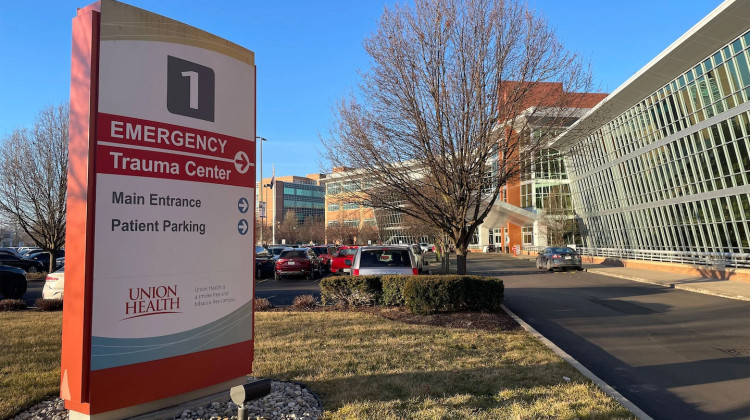When Toni and Jim Hoy adopted their son Daniel as a toddler, they did not plan to give him back to the state of Illinois 10 years later.
“Danny was this cute, lovable little blonde-haired, blue-eyed baby,” Jim said. There were times Daniel would reach over, put his hands on Toni’s face and squish her cheeks.
“And he would go, ‘You pretty mom,’” Toni said. “Oh my gosh, he just melted my heart when he would say these very loving, endearing things to me.”
But as Daniel grew older, he began to show signs of serious mental illness that manifested in violent outbursts. When his parents exhausted all other options, they decided to relinquish custody to the state to get Daniel the treatment he needed.
“To this day it’s the most gut-wrenching thing I’ve ever had to do in my life,” Jim said. “But it was the only way we figured we could keep the family safe.”
Across the U.S., children encounter many barriers to mental health treatment, including a shortage of psychiatric beds and coverage denials from insurance companies. In a desperate attempt to get their child treatment, some parents have discovered a last resort workaround: they trade custody for treatment.
Known as a psychiatric lockout, a parent brings a child to a hospital and refuses to pick them up. The child then enters foster care, and the state is obligated to pay for their care.
This happened to Daniel in 2008, and has happened to thousands of other children before him, according to a report from the Government Accountability Office.
Today, despite a 2015 Illinois law that states families should never have to trade custody for mental health treatment, at least four children a month enter state custody this way, according to data obtained by Side Effects.
Out of options
Daniel grew up as the youngest of four children in Ingleside, just north of Chicago. As a baby, he’d been severely neglected -- starving and left for dead -- and the early trauma Daniel experienced affected his brain development.
At around age 10, his post-traumatic stress disorder manifested in violent outbursts.
“You could almost tell the stories that would describe him like a monster," Toni said. “He held knives to people’s throats. He tried putting his fingers and his tongue in the light sockets. He broke almost every door in the house.”

Toni Hoy gave up parental custody to help her 12-year-old adopted son Daniel get access to mental health treatment. (Vinnie Manganello/WFYI)
In the car, there were times when he’d reach over and grab the wheel while Toni was driving to try and force the car into oncoming traffic. Other times, he would lash out at his siblings.
“At the same time, he’s a little boy,” she said. “He didn’t want to be that way. He didn’t like being that way.”
Despite Toni and Jim’s efforts to help their son with therapy, the violence escalated. Daniel was hospitalized almost a dozen times over a period of two years.
His doctors said he needed more intensive mental health services than he could get while living at home. He needed 24/7 residential treatment, but both Daniel’s private health insurance, and the secondary Medicaid coverage he received as an adoptee, denied coverage.
So the Hoys applied for a state grant meant for children with severe emotional disorders. They also asked for help from Daniel’s school district, which is supposed to cover a portion of the costs when students need residential care. They were denied both.
“We were told we had to pay out of pocket for it,” Toni said. The treatment could cost up to $150,000 a year, and that was money they didn’t have.
Then, during Daniel’s 11th hospitalization, the Illinois Department of Children and Family Services, or DCFS, gave the Hoys an ultimatum.
“[They] basically said, ‘If you bring him home, we’re going to charge you with child endangerment for failure to protect your other kids,’” Toni said. “‘And if you leave him at the hospital, we’ll charge you with neglect.’”
Out of options, the Hoys chose the latter option as a last-ditch workaround to get treatment.
Once the DCFS steps in to take custody, the agency will place the child in residential treatment and pay for it, said attorney Robert Farley, Jr., who is based in Naperville.
“So you get residential services, but then you’ve given up custody of your child,” he said. “Which is, you know, barbaric. You have to give up your child to get something necessary.”
Taking it to the courts
The Hoys were investigated by DCFS and charged with neglect. They appealed in court and the charge was later amended to a “no-fault dependency,” meaning the child entered state custody at no fault of the parents.
Losing custody meant Toni and Jim could visit Daniel and maintain contact with him, but they could not make decisions regarding his care.
Toni spent months reading up on federal Medicaid law and she learned the state-federal health insurance program is supposed to cover all medically necessary treatments for eligible children.
The Hoys hired a lawyer, and two years after giving Daniel up, they sued the state.
Less than a year later, in 2011, they settled out of court, regained custody of Daniel, who was 15, and got the funding for his care.

Twenty-three-year-old Daniel Hoy's parents gave him up to the state when he was 12 after exhausting all other options to get him treatment for severe post-traumatic stress disorder. After suing the state, they were able to regain custody. (Vinnie Manganello/WFYI)
Around the same time, Farley decided to take on the lack of access to mental health care on behalf of all Medicaid-eligible children in the state. He filed a class-action lawsuit, claiming Illinois illegally withheld services from children with severe mental health disorders.
“There [are] great federal laws,” Farley said. “But someone’s not out there enforcing them.”
In the lawsuit, Farley cited the state’s own data that shows 18,000 children in Illinois have a severe emotional or behavioral disorder, yet only about 200 of them receive intensive mental health treatment.
In a settlement in January, a judge ruled the state must make reforms to comply with Medicaid law. The state has until October to come up with a plan to ensure all Medicaid-eligible children in the state have access to in-home and community-based mental health services.
A law that didn’t fix the problem
While these legal battles were taking place, lawmakers began their own work to ensure parents no longer have to give up custody to get their children access to mental health services.
In Illinois, six state agencies interact with at-risk children in some form. But Democratic state Rep. Sara Feigenholtz said they operate in silos, which causes many children to slip through the cracks and end up in state custody.
“It's almost like these there's a vacuum, and the kids are just being sucked into DCFS,” she said.
Feigenholtz worked to get a bill passed in 2014. The Custody Relinquishment Prevention Act, which became law in 2015, orders those six agencies to work together to help families that are considering a lockout to find care for their child and keep them out of state custody.
So the agencies developed a program together that launched in 2017 -- years after the deadline set by the law. It aims to connect children to services.
But Feigenholtz said the fact lockouts still happen shows a lack of commitment on behalf of the agencies.
“I think the question is: Shouldn’t government be stepping in and doing their job? And they’re not,” she said. “We just want them to do their job.”
B.J. Walker, head of DCFS, said the reasons lockouts happen are complex. “If law could fix problems, we’d have a different world,” she said.
Walker said many children in need of residential treatment for mental illness have such severe or unique conditions that it can be a struggle to find a facility that’s willing and able to take them.
Even for families that get state funding to pay for the care, families Side Effects Public Media spoke to said the waiting lists can run six months or longer. When parents are unable to arrange a placement, the child may enter state custody, and as ProPublica Illinois reports, they could languish for months in emergency rooms that are ill-equipped to provide long-term care. Some out-of-state facilities are not willing to accept Illinois children, citing concerns over severe delays in payments that stem from a recent two-year budget crisis in Illinois.
The program to prevent lockouts requires families take children home from the hospital after medical providers have done everything they can. But many parents say it’s not an option for them because their child remains too violent for home.
For these reasons, children continue to enter state custody as a final effort by their families to help them.
A spokesman for DCFS said in an email that, when the agency gets blamed for this problem, it’s like when a pitcher comes in at the end of a losing game to save the day and gets tagged with the loss.
What it will take to prevent lockouts
Lockouts can happen anywhere, but Heather O’Donnell, a lawyer with a Chicago-based mental health treatment provider, Thresholds, said the situation is particularly bad in Illinois.
She said a big part of the problem is that society sweeps mental health conditions under the rug until there’s a crisis.
“We don't have a very good system in Illinois for children or adolescent or young adults with significant mental health conditions,” O’Donnell said. “What Illinois needs to put into place is a system that helps these families early on so that these kids never get hospitalized.”
That’s what the state is trying to fix now.
The consent decree issued as part of the class-action lawsuit settlement requires the state to propose a plan by October to ensure all Medicaid-eligible children in the state have access to mental health services in their communities, with changes slated to begin in 2019. Farley estimates the changes will cost the state several hundred thousand dollars, based on what it cost other states like Massachusetts to implement similar reforms.

Daniel Hoy, 23, spends time with his 2-year-old daughter Sofie near their home in Rantoul, Illinois. When Daniel was a child, his parents gave up parental custody in order to help him get access to mental health treatment. He's been out of residential treatment for five years and says he would not have made it through without his parents' love and support. (Vinnie Manganello/WFYI)![]()
The difference treatment and family can make
Daniel Hoy is now 23 and has been out of residential treatment -- and stable -- for five years. He has a 2-year-old daughter, works nights for a shipping company in Rantoul, in central Illinois, where he recently moved to be closer to his parents.
Daniel said treatment was tough, and he would not have gotten better without his parents’ love and support.
“Sometimes it’s so hard to do it for yourself,” he said. “It almost helps to know that I’m doing it for myself, but I’m also doing it for my family and for our relationship.”
Toni’s thankful that despite losing Daniel while trying to help him, they ultimately made it through intact. She’s in touch with other families that have gone through lockouts too and most, she said, are not as lucky.
That’s why Toni said she will continue to speak out about this issue. “Kids do need services,” she said. “But they also need the support of their families. And when they have both, a lot of kids can be a lot more successful.”
This story was produced by Side Effects Public Media, a news collaborative covering public health.
Follow Christine on Twitter: @CTHerman
 DONATE
DONATE







 Support WFYI. We can't do it without you.
Support WFYI. We can't do it without you.